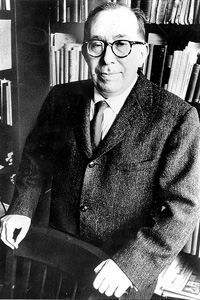Center will digitize material from nearly 50 courses Strauss taught
By William Harmsw-harms@uchicago.edu
News Office
 Leo Strauss |
|
The late Leo Strauss, a political philosopher who is among the University’s most celebrated faculty members, will “teach again” when tapes and transcripts of his courses are digitized and collected on a Web site to be built by the newly founded Leo Strauss Center.
The National Endowment for the Humanities is supporting the publishing project with a $350,000 grant over two years. In addition to the grant, the center is raising funds for the project, which is expected to cost $1.3 million.
“This unpublished record refers in part to the audiotapes, transcripts and class notes of some 47 courses Strauss taught, most of them here at the University of Chicago,” said Stephen Gregory, Administrative Coordinator of the Leo Strauss Center, who will be managing the project.
“We consider these to be an extraordinary resource for the study of Strauss’ thought, and, more generally, of political philosophy and the intellectual history of the 20th century,” said Nathan Tarcov, Professor in the John U. Nef Committee on Social Thought, who founded the Leo Strauss Center, the Web site of which will host the documents.
Strauss, a native of Germany, joined the University in 1949 as Professor in Political Science. That autumn, he presented a series of lectures titled “Natural Right and History,” which led to a book by the same title, published in 1953, that became his most widely known work.
In the lectures and the book, Strauss examined the question of natural right, the possibility of a standard of justice independent of and superior to human agreement or convention. He criticized what he called historicism, the perspective that all standards are relative to or imposed by particular historical situations.
“Leo Strauss is increasingly recognized as one of the most important thinkers of the 20th century,” Tarcov said. “His research stimulated significant developments in the study of ancient and modern political philosophy; American political thought, especially the founding; classics; Jewish studies; and Islamic studies, among other fields.”
In 1959, Strauss was appointed the Robert Maynard Hutchins Distinguished Service Professor. He moved in 1968 to Claremont Men’s College for a year and a half, and then in 1969 to St. John’s College-Annapolis, where he served as the Scott Buchanan Distinguished Scholar in Residence until his death in 1973.
Strauss published interpretations of writings by a wide range of figures, poets as well as philosophers, going far beyond the conventional canon of figures studied in the field of Western political theory.
Among his other books are The Political Philosophy of Hobbes, On Tyranny, Persecution and the Art of Writing and Thoughts on Machiavelli.
To listen to one session of Strauss’ audiotaped courses, visit http://www.septaudio.com/demos-restor.html.
![[Chronicle]](/images/sidebar_header_oct06.gif)